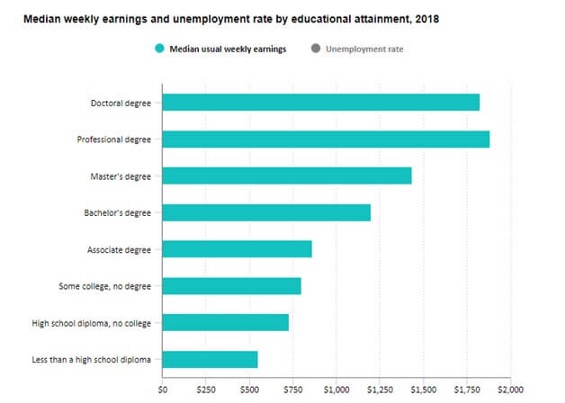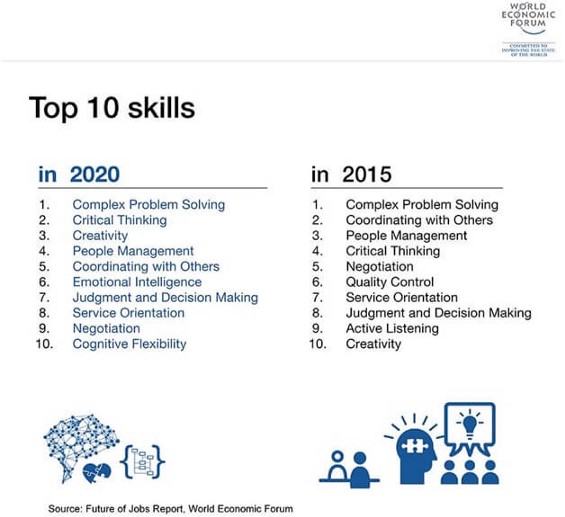Have you ever wondered whether experience or education will help you stay employed and make a decent wage? Let’s try and find out what’s more valuable to recruitment agencies and employers.
A recent survey by the student support organization College Board revealed the sad truth about college costs in the United States. The average cost of tuition for the 2017 – 2018 school year was $34,740 at private colleges, $9,970 for American residents at public colleges, and $25,620 for non-American residents at public universities.
In a world where a college education is more expensive than buying a house, many people are wondering: “Do I invest thousands of dollars on obtaining a college diploma? Or do I put in more years of work experience?”
It’s the never-ending dilemma about experience vs. education that the majority of high school graduates are struggling with. Does that higher degree get you the job you want, or does work experience count?
Let’s dive deeper into the topic.
The importance of education
According to the U.S. Bureau of Statistics, “it’s hard to quantify the full value of an education. But U.S. Bureau of Labor Statistics (BLS) data consistently show that, in terms of dollars, education makes sense.”
Their findings show that the more people learn, the more they earn. For example, a master’s degree can lead to higher pay than a bachelor’s degree. People with a doctoral or professional diploma have three times higher weekly earnings than people with a low-level diploma such as a high school diploma.
However, a doctoral degree gets you less money than a professional degree. The cause of this is because more Ph.D.’s enter fields that are low-paid, including research and teaching.
What’s more, higher education is closely related to lower unemployment rates. Individuals who hold a doctoral degree have the lowest unemployment rate of all the educational candidates on the chart.
In the eyes of recruiters or recruitment agencies, education means that you’re able to do your job and you don’t have to start learning from the beginning. They believe that college has equipped you with the skills required to do your job adequately, which also means less time and money spent on training. In short, education can equip you to better perform in the job you want to get. It looks good on your resume, and it looks great in the eye of a recruitment agency.


The importance of work experience
No one can deny the multiple benefits of work experience. Having valuable work experience in your resume can make you stand out from the crowd and attract any recruiter agency’s attention. In today’s world filled with competition in every single field, possessing a sought-after skill along with work experience is essential for the world of work.
Moreover, young professionals gain real-life skills through work experience. It helps prepare young people for the world of work and helps instill a strong work ethic. They learn how to communicate, work well with others, and develop critical thinking skills.
Another thing that needs to be taken into consideration is the future of work. Let’s say that you obtained a college degree 20 years ago. That degree is of little use today unless you have stayed up-to-date with current trends and developments.
We live in a rapidly changing era that’s governed by technology. New technologies are hitting the market daily, and innovations are advancing at an unprecedented rate. Technological developments are expected to disrupt or change the nature of employment rapidly.
Predictions say that we’ll lose over five million jobs to automation by 2025. However, a wide range of new jobs will appear which will be mostly related to knowledge creation and innovation. Meaning, in order to avoid skills shortage, we will need to adapt our skills to be ready for it.
Experts argue that soft skills will be equally important as hard skills in the future. The most sought after skills for the future will include:
- Problem-solving and critical thinking
- Creativity
- Emotional intelligence
- Decision-making
- Negotiation
- Cognitive flexibility
- People skills
Studies have found that if investment in training for soft skills is doubled, the number of jobs at risk from automation would drop from 10% to 4%. People will need to upskill, reskill, and retrain. A degree won’t suffice in the future of work. Companies will likely invest in in-house career development if they want to thrive.


A combination might be the best option
When discussing whether work experience or education is more important, we can arrive at the conclusion that both of them have their own beneficial points.
Showing both education and experience can help you land the job of your dreams. The two components nicely complement each other and can boost your chances of professional success.
Possessing a degree and working as a full-time worker can help you stand out from the crowd and be tagged as a hard worker who doesn’t lack dedication or motivation.
However, the field you’re in also counts. There are many career fields where education is more critical than experience and the other way around. For example, if you’re in software development, a college degree doesn’t necessarily get you the job you want. Job experience also counts more if you’re in sales or marketing.
On the other hand, education is critical when you’re in a more technical field, including mechanical engineering or astrophysics.
In the end, everything depends on you
Each side has worthy arguments, and there’s no one right answer. There’s no clear winner as each topic has its own advantages and disadvantages.
The majority of recruitment agencies or employers look for both theoretical and practical skills from candidates. But you can gain these skills from experience and education. So, choosing which way to go depends on your preferences and the field you’re in. You can have a stellar career by taking whichever road. And remember, even if you opt for work experience, you can always go back to college and obtain a degree.
Best of luck with your career!









